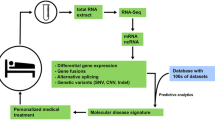Abstract
Cancer at its root is a genetic disease brought on by genomic alterations that lead to uncontrolled cell division, metastasis, and enhanced cell survival. The study of genomics can address many of the genetic abnormalities associated with cancer and represents a rapidly progressing field. Our knowledge base regarding specific gene mutations and alterations leading to cancer and the development of subsequent gene-targeted therapies is being rapidly transformed by the application of new RNA and DNA sequencing technology, including a number of high-throughput sequencing methods. In contrast to older Sanger sequencing methods, next-generation high-throughput sequencing methods enable the sequencing of thousands to millions of molecules at once. Here we review how the specific high-throughput sequencing method, RNA sequencing (RNA seq), can be utilized to study the impact of phytochemicals on growth factors, such as insulin-like growth factor, that have been shown to play a primary role in both cancer development and progression. RNA seq is a method of high-throughput sequencing of cDNA in order to gain information about a sample’s RNA content. In addition to determining an RNA sequence of a specific sample, RNA-seq provides information regarding an organism’s transcriptome, including information regarding abundances of transcripts, mutations, fusion transcripts, noncoding RNA, transcriptional modification, gene regulation, and protein information.
Access this chapter
Tax calculation will be finalised at checkout
Purchases are for personal use only
Similar content being viewed by others
References
Giovannucci E, Harlan DM, Archer MC, Bergenstal RM, Gapstur SM, Habel LA, Pollak M, Regensteiner JG, Yee D (2010) Diabetes and cancer: a consensus report. CA Cancer J Clin 60(4):207–221. doi:10.3322/caac.20078
Gallagher EJ, LeRoith D (2011) Minireview: IGF, insulin, and cancer. Endocrinology 152(7):2546–2551. doi:10.1210/en.2011-0231
Blackburn GL, Wang KA (2007) Dietary fat reduction and breast cancer outcome: results from the Women’s Intervention Nutrition Study (WINS). Am J Clin Nutr 86(3):s878–s881
Boyle P, Boniol M, Koechlin A, Robertson C, Valentini F, Coppens K, Fairley LL, Zheng T, Zhang Y, Pasterk M, Smans M, Curado MP, Mullie P, Gandini S, Bota M, Bolli GB, Rosenstock J, Autier P (2012) Diabetes and breast cancer risk: a meta-analysis. Br J Cancer 107(9):1608–1617. doi:10.1038/bjc.2012.414
Khan N, Afaq F, Saleem M, Ahmad N, Mukhtar H (2006) Targeting multiple signaling pathways by green tea polyphenol (−)-epigallocatechin-3-gallate. Cancer Res 66(5):2500–2505. doi:10.1158/0008-5472.CAN-05-3636
Shimizu M, Deguchi A, Hara Y, Moriwaki H, Weinstein IB (2005) EGCG inhibits activation of the insulin-like growth factor-1 receptor in human colon cancer cells. Biochem Biophys Res Commun 334(3):947–953. doi:10.1016/j.bbrc.2005.06.182
Shimizu M, Shirakami Y, Sakai H, Tatebe H, Nakagawa T, Hara Y, Weinstein IB, Moriwaki H (2008) EGCG inhibits activation of the insulin-like growth factor (IGF)/IGF-1 receptor axis in human hepatocellular carcinoma cells. Cancer Lett 262(1):10–18. doi:10.1016/j.canlet.2007.11.026
Masuda M, Suzui M, Lim JT, Deguchi A, Soh JW, Weinstein IB (2002) Epigallocatechin-3-gallate decreases VEGF production in head and neck and breast carcinoma cells by inhibiting EGFR-related pathways of signal transduction. J Exp Ther Oncol 2(6):350–359
Kang JH, Song KH, Woo JK, Park MH, Rhee MH, Choi C, Oh SH (2011) Ginsenoside Rp1 from Panax ginseng exhibits anti-cancer activity by down-regulation of the IGF-1R/Akt pathway in breast cancer cells. Plant Foods Hum Nutr 66:298–305
Zi X, Zhang J, Agarwal R, Pollak M (2000) Silibinin up-regulates insulin-like growth factor-binding protein 3 expression and inhibits proliferation of androgen-independent prostate cancer cells. Cancer Res 60(20):5617–5620
Wang HJ, Tashiro S, Onodera S, Ikejima T (2008) Inhibition of insulin-like growth factor 1 receptor signaling enhanced silibinin-induced activation of death receptor and mitochondrial apoptotic pathways in human breast cancer MCF-7 cells. J Pharmacol Sci 107(3):260–269
McLaughlin JM, Olivo-Marston S, Vitolins MZ, Bittoni M, Reeves KW, Degraffinreid CR, Schwartz SJ, Clinton SK, Paskett ED (2011) Effects of tomato- and soy-rich diets on the IGF-I hormonal network: a crossover study of postmenopausal women at high risk for breast cancer. Cancer Prev Res (Phila) 4(5):702–710. doi:10.1158/1940-6207.CAPR-10-0329
Power KA, Chen JM, Saarinen NM, Thompson LU (2008) Changes in biomarkers of estrogen receptor and growth factor signaling pathways in MCF-7 tumors after short- and long-term treatment with soy and flaxseed. J Steroid Biochem Mol Biol 112(1–3):13–19. doi:10.1016/j.jsbmb.2008.07.003
Chen J, Saggar JK, Corey P, Thompson LU (2011) Flaxseed cotyledon fraction reduces tumour growth and sensitises tamoxifen treatment of human breast cancer xenograft (MCF-7) in athymic mice. Br J Nutr 105(3):339–347. doi:10.1017/S0007114510003557
Chen J, Zeng J, Xin M, Huang W, Chen X (2011) Formononetin induces cell cycle arrest of human breast cancer cells via IGF1/PI3K/Akt pathways in vitro and in vivo. Horm Metab Res 43(10):681–686. doi:10.1055/s-0031-1286306
Vogelstein B, Kinzler KW (1993) The multistep nature of cancer. Trends Genet 9(4):138–141
Feng H, Qin Z, Zhang X (in press) Opportunities and methods for studying alternative splicing in cancer with RNA-Seq. Cancer Lett. doi:10.1016/j.canlet.2012.11.010
Soule HD, Vazguez J, Long A, Albert S, Brennan M (1973) A human cell line from a pleural effusion derived from a breast carcinoma. J Natl Cancer Inst 51(5):1409–1416
Jackson JG, White MF, Yee D (1998) Insulin receptor substrate-1 is the predominant signaling molecule activated by insulin-like growth factor-I, insulin, and interleukin-4 in estrogen receptor-positive human breast cancer cells. J Biol Chem 273(16):9994–10003
Zhang H, Fagan DH, Zeng X, Freeman KT, Sachdev D, Yee D (2010) Inhibition of cancer cell proliferation and metastasis by insulin receptor downregulation. Oncogene 29(17):2517–2527. doi:10.1038/onc.2010.17
Nagalakshmi U, Waern K, Snyder M (2010) RNA-Seq: a method for comprehensive transcriptome analysis. Curr Protoc Mol Biol 4.11.1–4.11.13. doi:10:1002/0471142727.mb0411s89
Wilhelm BT, Marguerat S, Goodhead I, Bahler J (2010) Defining transcribed regions using RNA-seq. Nat Protoc 5(2):255–266. doi:10.1038/nprot.2009.229
Author information
Authors and Affiliations
Editor information
Editors and Affiliations
Rights and permissions
Copyright information
© 2014 Springer Science+Business Media New York
About this protocol
Cite this protocol
Beckwith, H., Yee, D. (2014). Utilizing RNA-Seq to Define Phytochemical-Induced Alterations in Insulin and IGF-Regulated Transcriptomes. In: Bode, A., Dong, Z. (eds) Cancer Prevention. Methods in Pharmacology and Toxicology. Humana Press, New York, NY. https://doi.org/10.1007/978-1-4614-9227-6_9
Download citation
DOI: https://doi.org/10.1007/978-1-4614-9227-6_9
Published:
Publisher Name: Humana Press, New York, NY
Print ISBN: 978-1-4614-9226-9
Online ISBN: 978-1-4614-9227-6
eBook Packages: Springer Protocols




